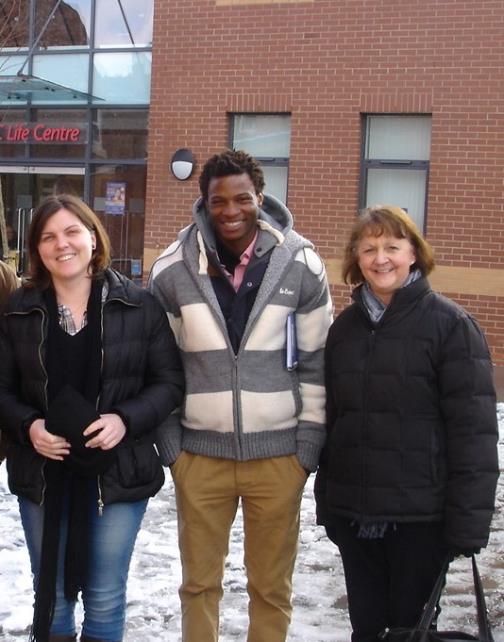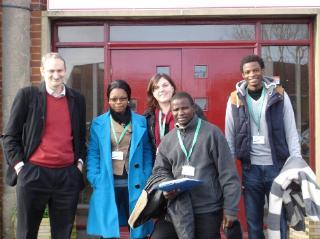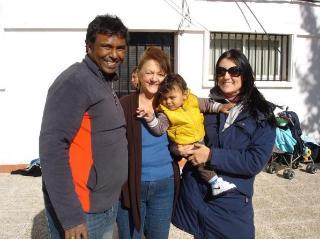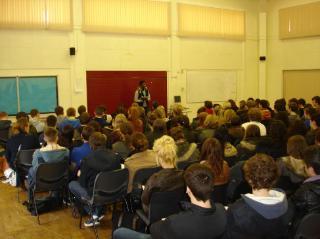Training young peacemakers
As well as working with local schools and civil society, the Peace Committee seeks to play an international role.
The Peace Committee has a long--standing link with the Luton-based School of Reconciliation and Justice (SORJ), in which we use the academic expertise of Peace Committee members to give teaching input to the SORJ’s programme. This formal teaching input goes back to 2008, and since 2013 the SORJ has visited Newcastle on an annual basis. The SORJ grew out of the Reconciliation Walk, a grassroots UK-based peacebuilding initiative that saw participants walk the length of the First Crusade route with a message of apology.
In recent years we have taught students from many countries including Brazil, Canada, Indonesia, Ireland, Nigeria, Rwanda, UK, USA, Spain, Syria, Zambia, and Zimbabwe. Whilst in Newcastle, students receive teaching on topics such as nationalism, geopolitics and peacebuilding through storytelling. They also visit local schools, churches, mosques and youth groups, as well as interacting with students at Newcastle and Northumbria universities.
We include below a number of staff and alumnus biographies.

Eliceli, Nanzip and Cathy before a speaking and youth group engagement at Heaton Baptist Church.
Cathy Nobles (leader, right on picture)
During the years of working on the Reconciliation Walk, I saw how much young people could contribute to rebuilding areas of conflict when they began to live a life of peacebuilding. Today many of our students come from places scarred by poverty and war. Thanks to the university’s generosity in hosting us, the groups we bring to Newcastle eventually return home with broader experience that proves valuable to them. I also felt that each gained confidence from being at the University and experiencing life with other students their ages. Also the community and school visits that the Peace Committee set up for us gave us an opportunity to tell others about our home cultures and our dreams of peace for our region and in response others shared their hopes for the future.
Sodangi Jock John, Nigeria (student and subsequently staff)
This account was related at one of the public meetings in Newcastle, by Nanzip. It is about Sodangi, who had previously undertaken training in peacebuilding with Peace Committee people as part of the SORJ.
“Last year there was uproar in Kaduna one of the Northern States of Nigeria, which is inhabited by both Muslims and Christian communities. The conflict began unexpectedly (as usual), when people were out going about their daily business. Some Muslim merchants and street traders had already entered into Christian dominated communities trading and selling their products, mostly things that are needed on a daily basis like water, gas, food items, second hand clothes etc. Suddenly rumors of killings began spreading and people were running for safety and their lives. Christians in Muslim communities were reported to be hunted, and Muslims in Christian communities were being hunted as well. A Christian friend of mine, Sodangi, his family and compound mate had the opportunity to be different in the midst of this intense situation. Some traders who happened to be Muslim were around my friend’s neighborhood and were in danger and needed somewhere to hide for safety as there were already people being killed out on the streets. The vulnerable fellows ran into my friend’s compound where they got saved from what would have meant the end of their lives. Meanwhile some angry people on the street had seen them running into my friend’s compound and went after them immediately requesting they should be brought out so they could kill them in revenge of those that were being killed in their own communities. My friend and his mates refused to give them up to be killed: instead they called the police who came and rescued the vulnerable petty street traders from death.
As we might guess some of the people that wanted to kill the poor guys were unhappy with my friend for his intervention. What Sodangi and his mates did was an act of bravery by risking their own lives for the others. This is because such intervention is not allowed and is seen as treachery and weakness on both sides especially in a conflict of such magnitude. One might ask, what then drove my friends and his mate to risk their lives for the sake of the people they don’t even know. This reminds me of the question people were asking when Jesus was on the cross, they said; “he saved others why can’t he save himself…?” Yet what he was doing is in obedience to the will of the father. What my friend and his mates did was an action that illustrates the command to love God with all our heart, strength and mind and our neighbors as ourselves (Bible, Luke 10: 27). Who is a neighbor? We might be asking… Jesus was asked the same question by religious experts, and in response he told the story of the Good Samaritan. The characters in that story were not friends with each other or people of the same beliefs and ethnicity. In the conclusion of that story, a Samaritan rescued and cared for a man he never knew, out of compassion. Consequently, the religious experts who wanted to know who what a true neighbor is… were asked the same question, and they all agreed that is was the Samaritan who showed mercy.”
Sodangi went home after staffing SORJ and was able to run some workshops on Peacebuilding from what he learned. He and his family are currently in the UK where they have joined the Reconciliation Walk Community where they will be helping with several community projects with the goal of restoring community. They are seeking to develop something similar for peacebuilding in their home area.
Eliceli Bonan, student, Brazil (centre back) 
“Spending a week in Newcastle for me was the realization of a personal dream. I am Brazilian born in the southern region of the country, and I always dreamed of pursuing a degree in England. However, my family's financial conditions did not allow that, and I ended up doing my Bachelor's Degree in Journalism in my hometown. But we never know the surprises that life prepares for us! Sitting in the University of Newcastle… was living a dream.
The opportunity given to our team by the Martin Luther King Peace Committee was a unique moment of cross-cultural experience and intellectual growth. I managed to establish new connections and have new understandings about world politics, and I have received a lot of information that will certainly be helpful in my profession and personal life. I have developed a vision of work that I want to be a part of promoting justice and acting as a peacemaker in different parts of the world where people find themselves in conflict situations (religious, political, tribal, international, etc). I am still in my stage of establishing foundations for this vision and being be part of the lectures, discussions and classes to which we had access to in Newcastle has given me new tools to use in my work as a peacemaker.”
Today Eliceli is pursuing her educational dream. She has returned to Brazil and studied to prepare for her exams to be able to pursue a Master’s Degree in Peacebuilding. She wants to write her thesis in the area of the use of storytelling in Peacebuilding and will build on the research she did as a journalist interviewing people in Columbia concerning their conflict.
Jitu and Vanessa Dongardive (students, left).
Jitu and his wife Vanessa were students on SORJ in 2010. Since then they have continued to expand their work with orphans in India along with getting involved with social justice issues in their home country, Spain. Jitu is currently beginning a doctorate in the area of Peacebuilding from Fuller Seminary, US.
Nanzip Lannap, (student then subsequently staff, Nigeria, picture at St Thomas More school, Newcastle).
“Nick’s teaching on geopolitics has been phenomenal and mind blowing when I looked at how geography plays out in the politics of my country Nigeria. Our world is undoubtedly in need of reconciliation and justice and we as a team who have felt some of the injustices and conflict in our world have resolved not to add fuel to the fire but instead we are dedicated ourselves to finding solutions by spreading the message of reconciliation and justice wherever we find ourselves. Newcastle has indeed been a strategic place to practice and learn with the Northumbria and Newcastle and Universities Martin Luther King Peace Committee as we seek to pursue our call as peacemakers. We have all increased our understanding of this call through this opportunity we had to share and listen to each other’s stories and ideas.”
Today Nanzip is continuing to develop his call to peacemaking through helping develop the work of the Reconciliation Walk Community in Luton. Through working with several local projects, he is hoping to help develop a model of how to rejuvenate a troubled community.